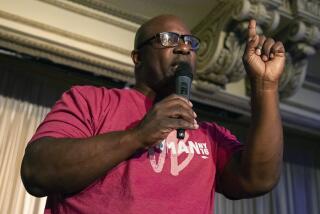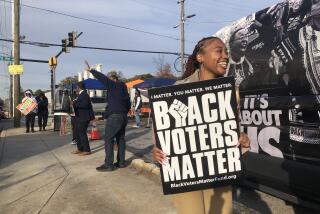Eight-State Sweep Puts Dole in Control; Alexander to Drop Out
- Share via
ATLANTA — A triumphant Sen. Bob Dole swept to victory in eight presidential primaries Tuesday, resurrecting his standing as the Republican front-runner so convincingly that two of his competitors began planning their exits from the race.
Dole dominated the field in Georgia--which his most tenacious opponent, Patrick J. Buchanan, had defined as crucial--as well as Colorado, Connecticut, Maine, Maryland, Massachusetts, Rhode Island and Vermont.
With nearly half of the votes tallied in the Minnesota straw poll caucus, Dole was ahead there as well. Results from the second caucus state, Washington, were not yet available.
“We’ve found a leader to bring the Republican Party together,” Dole declared to supporters in Washington, D.C. “And pretty soon we’re going to unite and achieve one purpose--that’s to defeat Bill Clinton in November 1996.”
As Dole embraced the sweeping success that has for so long eluded his stuttering campaign, other presidential candidates conceded the inevitable. Both Lamar Alexander, the former governor of Tennessee, and Sen. Richard G. Lugar of Indiana called supporters to say they were quitting the race. Alexander scheduled a press conference in Nashville, Tenn., for 10 a.m. PST where he will make his decision official. Lugar is expected to make his announcement in Washington.
Neither man had made a significant impact thus far in the race, and both were under strong pressure from establishment Republicans to clear the field for Dole. But Dole’s two other rivals--Buchanan and Steve Forbes, the millionaire publisher, insisted they were sticking in the race.
Buchanan, who has pledged to remain in the race until August’s GOP National Convention in San Diego, was realistic about his own chances but could not resist a gibe at Dole.
“It’s a very uphill battle,” he told reporters aboard his campaign plane en route to Miami from Buffalo. “Dole had a very good night. He’s won all these things. But he’s got to look at this and he’s got to say, geez, is that guy going to be on my tail still?”
Forbes, for his part, insisted that his showing was “credible.”
He said he looked forward with “gusto” to the pared-down field of three. “This is my kind of contest,” he said.
A total of 208 delegates were at stake in Tuesday’s primaries, roughly a fifth of those needed to win the nomination. Results showed Dole commanding 185 of them. Buchanan, with second-place showings in five states--Georgia, Maine, Maryland, Colorado and Massachusetts--won 14 delegates. Nine went to Forbes, who was running third in five states and second only in Connecticut. Second place in Vermont remained uncertain. The caucuses in Washington and Minnesota will influence the allocation of 51 additional delegates, but final allotments will not be made until later this spring.
Sounds Like Nominee
Buoyed by the results and the prospect of a narrower field for future primaries, Dole at his victory party spoke like the putative nominee:
“All my life in politics, I’ve been trying to bring people together, and I’ll do the same as our Republican nominee, and I’ll do the same as the next president of the United States.
“We’re not young or old, black or white, disabled or non-disabled, rural or urban or whatever. We’re one America, and as long as we believe we’re one America we’re going to move America forward to the next century.”
With an eye to reuniting a party riven by deep disputes in this roller coaster of a primary season, Dole said that Republicans were “not spinning apart but coming together.”
The breadth of Dole’s geographically disparate victories wrapped the Senate majority leader once again in the cloak of inevitability he had worn before his narrow win in Iowa and his loss to Buchanan in New Hampshire.
Merely a week ago, the GOP race was a nasty, mudslinging and inconclusive battle with Dole, Buchanan and Forbes all having won a contest, but none of them able to break free. But now, while Dole may not formally clinch the nomination before California’s primary on March 26, his solid win in South Carolina last Saturday combined with the victories in Tuesday’s voting will give him a commanding lead.
Battle Shifts to N.Y.
Next up on the forward-barrelling campaign calendar is Thursday’s contest in New York, where Dole and Forbes are the only candidates on the ballot statewide. Next Tuesday brings a round of balloting in five Southern states--including Florida and Texas, where Dole today was to pick up the endorsement of Gov. George W. Bush, son of the former president who defeated Dole in the 1988 Republican presidential contest. Oregon also votes next Tuesday.
Surveys of voters taken after they cast their ballots showed that Dole’s decisive showing in this round of primaries was fueled by consolidating his hold on voters of all political persuasions and co-opting Buchanan’s target groups. He did particularly well among those who had been in Buchanan’s pocket in earlier contests--the religious, the very conservative, the economically uneasy and those who worry about the nation’s moral drift.
The two split religious conservatives, a group particularly important to Buchanan in Georgia. Dole won a third of the voters who described themselves as very conservative, was only slightly behind Buchanan among voters who favor a constitutional ban on abortion and bettered the former commentator for the votes of those more concerned about moral problems than the economy.
Continuing a trend seen in earlier primaries, more than half of the voters worried that Buchanan was too extreme and most of those sided with Dole, according to the polls by Voter News Service, a cooperative of the four major television networks and the Associated Press.
In a demonstration of Dole’s reach, he not only was close to Buchanan among those who favored outlawing abortion, but also won half the votes from those who oppose such a move. Similarly, Dole captured half of religious conservatives and the non-religious. And Dole’s relative success among the very conservative was teamed with winning the votes of party moderates.
Buchanan Thwarted
When it came to the economy, it was clear that Dole managed to blunt Buchanan’s attempts to secure the votes of those anxious about the economic present and worried about the future.
Voters were split on whether America’s standard of living would rise or fall in the next 10 years. Dole won half of the optimists, and beat Buchanan even among the pessimists.
In this year’s hyper-compressed presidential nominating sequence, no single day has yet come close to matching this latest round of voting--either in its mix of geography, riches of delegates or chess-game complexity. For the first time, small-state retail politics yielded to a broad, wholesale contest.
To the challenge, Dole brought not only momentum but unmatched campaign experience, a well-tended organization and widespread establishment backing.
Dole’s foes, instead of trying to win the nomination for themselves, were left to seek a lesser goal--hoping to bring the Senate leader down a notch or two, or maybe more, and thus raise anew the familiar doubts about whether Dole was too much the insider, too battle scarred and compromised, to make the case against Bill Clinton.
While Dole’s future course will be simplified by the departures today of Alexander and Lugar, two other challengers remain in the mix--Rep. Robert K. Dornan and former State Department official Alan Keyes. In Tuesday’s voting, Keyes’ best showing was fifth in Maryland, with 5%. Dornan did not receive as much as 1% in any state.
Even as they cast votes for him Tuesday, some of Dole’s supporters continued to express these very doubts.
“We ain’t got much,” said Columbus, Ga., voter Harold Dudley about his choices. The 75-year-old retired federal worker voted for Dole but said: “I don’t think he’s going to win [in November]. Clinton’s going to make him look bad in any debate. But everybody else is kind of a radical.”
Before Tuesday’s balloting, the nominating race already had moved full-swing toward New York--the first of the huge states to have its say this campaign.
Speaking to a bipartisan audience in a state where GOP politics is generally moderate, Dole for the second time in two days backed further away from his support for a national flat tax to replace the progressive income tax. In this case, Dole suggested that he might favor a higher tax rate on the more affluent.
“We’re looking at a single rate concept with flexibility,” Dole explained to the Assn. for a Better New York in Manhattan. “Maybe there will have to be a second bracket for the upper incomes.”
For weeks, Dole has equivocated on whether he could support a system that would tax all income at a flat rate--the heart of all Republican tax-reform plans, including the ones proposed by Forbes, Buchanan and a Republican commission chaired by Jack Kemp, the former secretary of Housing and Urban Development.
Buchanan spent much of Tuesday in a final scramble for votes in Georgia, making light of his diminished prospects. While getting his hair cut at a mall in Columbus, the onetime newsman quipped about the headlines to come: “Buchanan gets trimmed in Georgia--I can see it.”
Later, as he moved on to Buffalo, Buchanan’s mood turned more somber. But not his fight, as he began talking about the GOP convention in California. “We’re going all the way to San Diego to do battle for our beliefs and our convictions,” he said.
Buchanan also repeated his complaints about what he called the unfairness of New York’s election laws. Because of the state’s strict-access rules, Buchanan is on the ballot in about two-thirds of the state’s congressional districts. His New York supporters should cast protest votes for Forbes in areas where he is not on the ballot, Buchanan told an Albany-area radio audience.
Forbes Disappointed
Also campaigning in New York, Forbes faced a disappointment of another kind: He has long courted Kemp, the former Cabinet secretary, congressman, conservative intellectual and Buffalo Bills quarterback, in hopes of an endorsement. Forbes considers himself a protege of Kemp, and the publishing magnate launched his presidential campaign only after Kemp decided not to run.
After talking with Kemp on the phone, Forbes spent an anxious morning waiting in Buffalo. Finally, Forbes moved on empty-handed. “I don’t know whether he’s going to endorse a candidate,” Forbes said.
While Forbes was campaigning in person, he also sent out letters that included appeals for low-budget contributions.
For $20, a respondent was promised membership on his national steering committee.
Forbes offered a sweetener to contributors: “I will match your contribution dollar for dollar. Equal partners.”
Shogren reported from Georgia, Brownstein from New York. Also contributing to this story were Times staff writers Bob Sipchen in New York and Cathleen Decker and John Balzar in Los Angeles.
* RELATED COVERAGE: A5
More to Read
Get the L.A. Times Politics newsletter
Deeply reported insights into legislation, politics and policy from Sacramento, Washington and beyond. In your inbox twice per week.
You may occasionally receive promotional content from the Los Angeles Times.










